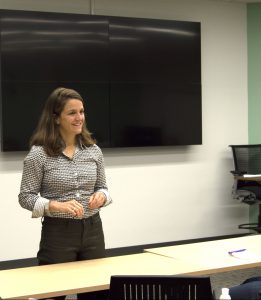
By Tate Glover
Elizabeth Gerber is an Associate Professor of Mechanical Engineering at Northwestern’s McCormick School of Engineering and the faculty founder of Design for America. Her interests and areas of study often intersect multiple disciplines and bring into sharper focus the role of technology and design in the modern era. Gerber came to speak with the MSLCE program during our Professional Development class.
Gerber focused primarily on the work done by Design for America. She described Jerry the Bear, a stuffed bear that helps children with type 1 diabetes. The bear was created to help children understand how to take care of themselves and the different requirements of their bodies at a young age. Design for America has also worked with hospitals to improve hand washing. They have created a device that helps doctors monitor their hand washing behaviors and minimize the spread of disease that occurs when treating multiple patients in a row.
Design for America tackles problems that are sometimes overlooked, but can be fixed with straightforward solutions that dramatically improve people’s lives. The program has been successful to the point that there are design labs opening up globally to support communities in a variety of countries.
Student Ben Shiplett asked Gerber whether she had any advice on selecting a mentor. Gerber responded that she actually has a student who is working on creating an algorithm for that very problem. Typically people reach out to mentors too early, before they know exactly what kind of help they need. Or, on the flip side, they reach out too late, when they really needed the help in the earlier stages of their project. Gerber suggests to pinpoint what you will be asking for before you contact people for aid and try to determine whether now is the right time.